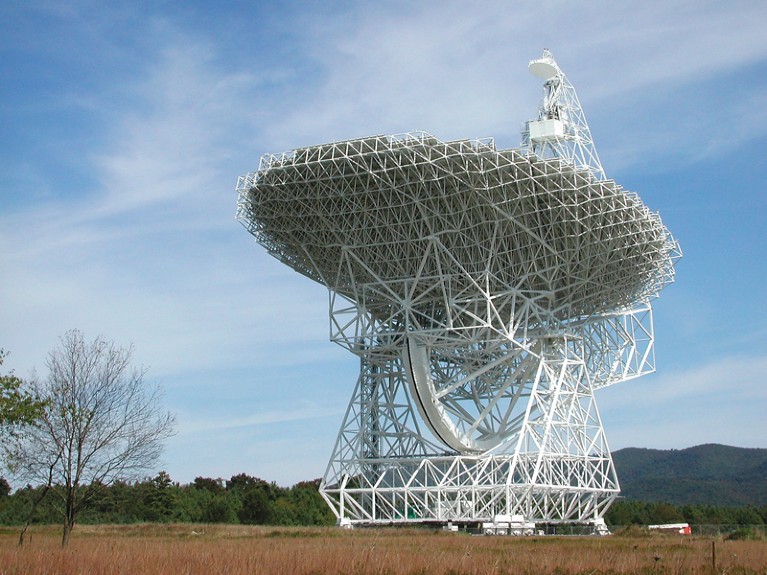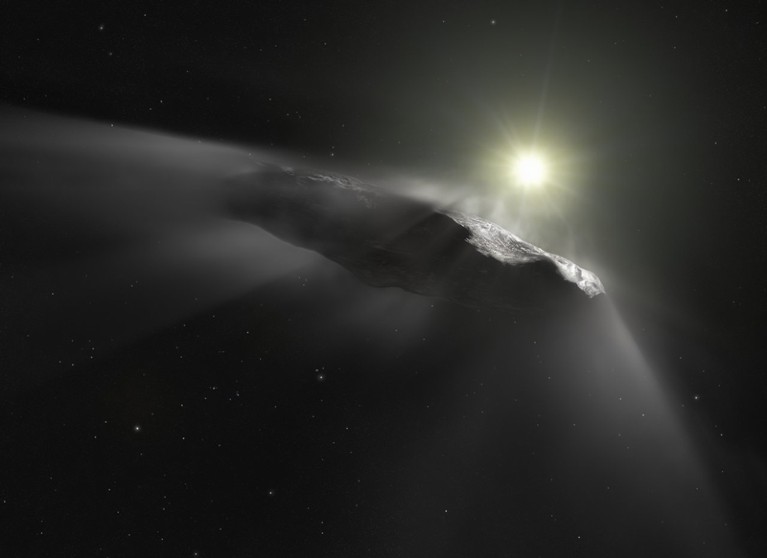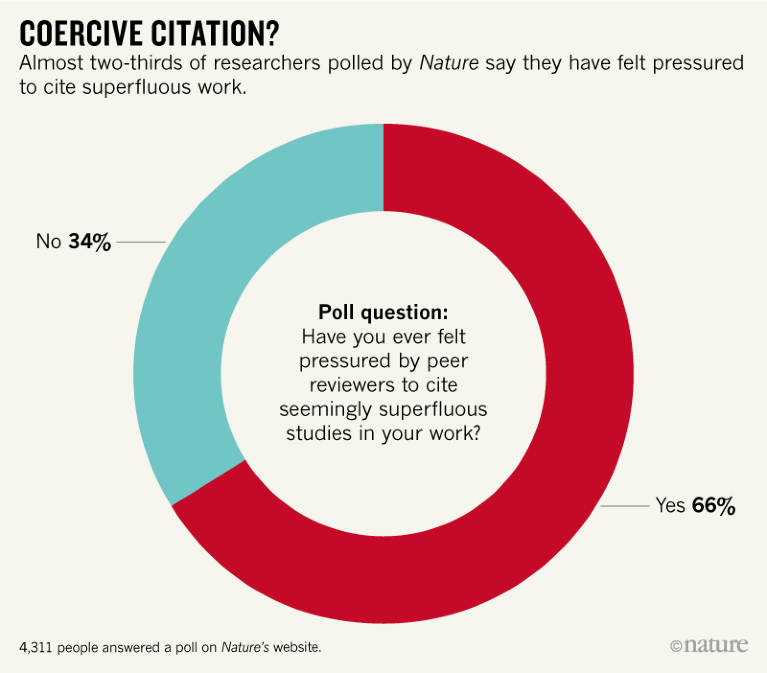FACILITIES
Telescope wins funding reprieve The US National Science Foundation (NSF) will continue to fund operations at the Green Bank Observatory in West Virginia, which is home to the world’s largest fully steerable radio telescope. In a decision announced during a 23 September briefing, the agency said that it would give the facility US$37 million over the next five years. The move comes seven years after an NSF committee recommended that the agency divest from the observatory to free up money for newer telescopes. But subsequent studies showed that Green Bank remains a cutting-edge astronomical facility and is worth the investment, NSF officials said at the briefing. The observatory currently receives $8.4 million per year from the NSF; under the new agreement, the amount will drop slightly but will never be below $7 million annually.

The Green Bank observatory is home to the world’s largest fully steerable radio telescope.Credit: NRAO/AUI/NSF/SPL
CLIMATE
Arctic thaw Arctic sea ice reached its second-lowest extent ever observed on 18 September, the US National Snow and Ice Data Center in Boulder, Colorado, said on 23 September. The minimum ice extent for the summer of 2019 was 4.15 million square kilometres, tying it with 2007 and 2016 for the second-lowest minimum seen since satellite observations began in 1979. Heavy ice loss this spring in areas including the Bering Sea set the stage for extremely low ice levels in July and early August. The rate of loss slowed in mid-August, moving 2019 away from record territory and into the number-two slot. The worst year on record was 2012, when just 3.41 million square kilometres of Arctic sea ice lingered at the end of the melting season. All 13 of the lowest Arctic sea-ice extents have been recorded in the past 13 years.
Climate pledges Dozens of governments and organizations pledged to do more to combat global warming at the United Nations climate summit in New York City on 23 September. During the meeting, 77 countries and more than 100 cities committed to achieving net‑zero carbon emissions by mid-century. And a coalition of development banks said that it would mobilize US$1 trillion for clean energy in 20 of the poorest countries by 2025. Environmentalists said that the commitments weren’t enough to limit average global temperature increases to 1.5–2 °C above pre-industrial levels. In light of perceived inaction by the world’s nations, 16 youth activists, including Swedish campaigner Greta Thunberg, filed a legal complaint on 23 September with the UN Committee on the Rights of the Child. They allege that Argentina, Brazil, France, Germany and Turkey have violated their human rights by not taking adequate action to stop climate change. Separately, Russia, one of the world’s largest emitters of greenhouse gases, announced on 23 September that it would formally accept the Paris climate agreement, becoming the 187th party to do so.
Climate cash A billionaire California couple has given the California Institute of Technology (Caltech) in Pasadena US$750 million for research on climate change and sustainability. The donation, one of the biggest ever to a US university, comes from Stewart and Lynda Resnick, who built their fortune in wine, juice, drinking water, fruit and nuts in drought-stressed California. The gift will support research in fields such as climate science, energy, biofuels and decomposable plastics. The Resnicks’ best-known brands include FIJI water and POM pomegranate juices, which are packaged in plastic. Caltech said the funds will be used to construct a sustainability resource centre where scientists from various fields will work together to solve environmental problems. Its four topics of focus will be solar energy and electricity, climate change, water resources and engineering the biosphere.
POLICY
EU petition Thousands of European scientists are protesting against the omission of ‘research’ from the job title of the European Union’s new science-policy chief. Last month, Bulgarian political scientist Mariya Gabriel was nominated to lead the European Commission’s Directorate General for Innovation and Youth, previously called Research and Innovation. More than 9,000 researchers, including 18 Nobel laureates, have signed an open letter calling on the European Parliament and the European Commission to add ‘research’ and ‘education’ to the title. Gabriel will succeed Carlos Moedas, the outgoing commissioner for research, science and innovation. She will be in charge of EU research policies, including Horizon Europe, the bloc’s next major research programme. Scientists fear that the “innovation and youth” title might signify an increased emphasis on research with direct economic benefits, at the expense of pure science.
SPACE
Interstellar visitor A comet first spotted inside the Solar System in August is an interstellar visitor, the International Astronomical Union announced on 24 September. Formally known as 2I/Borisov, it’s only the second object ever confirmed to be from beyond the Solar System; the other is known as ‘Oumuamua, and was discovered in 2017. Amateur astronomer Gennady Borisov spotted the comet on 30 August using a telescope that he built. Other astronomers tracked 2I/Borisov over the following weeks, and eventually confirmed that the object is moving on an orbit that’s not bound by the Sun’s gravity. The comet will remain visible for months to come and will make its closest pass to the Sun on 7 December. Astronomers continue to gather information about the object, and observations suggest that it is a few kilometres in diameter.

Artist’s impression of ‘Oumuamua, an interstellar object discovered in 2017.Credit: ESA/Hubble, NASA, ESO, M. Kornmesser
FUNDING
Stagnant spending The French government’s spending on research will remain flat at around €7 billion (US$7.6 billion) in 2020. The budget, adopted by the cabinet on 27 September, will increase funds for the French Ministry of Higher Education, Research and Innovation by 2%, to €25.35 billion. But the portion that is earmarked for research is €6.94 billion, roughly the same as for 2019. Observers note that research fared well given the circumstances: the 2020 budget had billions of euros in tax cuts to appease the ‘yellow vest’ protesters, who have been demonstrating since last year against President Emmanuel Macron’s economic-reform policies. Many scientists look forward to 2021, when the government is expected to create its first national strategy for research. The plan should energize French science, and might come with a meatier funding boost. Working groups helping to develop the strategy described the “erosion and stagnation of French research, both in spending and scientific output” in a report released last week.
AWARDS
Genius grants Seven scientists are among the 26 winners of this year’s ‘genius grants’, awarded by the MacArthur Foundation in Chicago, Illinois. They include two geoscientists studying sea-level rise — Andrea Dutton at the University of Wisconsin–Madison, who has reconstructed sea levels during periods of global warming in the ancient past using fossilized corals, and Jerry Mitrovica at Harvard University in Cambridge, Massachusetts, who uses statistical models to predict future changes in sea level. Another of this year’s winners is Joshua Tenenbaum, a cognitive scientist at the Massachusetts Institute of Technology in Cambridge who hopes to improve artificial-intelligence systems by studying how humans learn. The awards, announced on 25 September, give US$625,000 of ‘no strings attached’ funding to US-based creative people in any field, paid out in quarterly instalments over 5 years.
TREND WATCH
An online poll question answered by more than 4,300 Nature readers suggests that many researchers have felt pressured to cite studies in their work that seem unnecessary. Readers were asked, ‘Have you ever felt pressured by peer reviewers to cite seemingly superfluous studies in your work?’, to which almost two-thirds responded ‘yes’. The poll accompanied a news story revealing that the Dutch publisher Elsevier had found that a small proportion of academics reviewing papers for its journals were asking study authors to reference the reviewers’ own papers in exchange for a positive report. This practice is broadly labelled coercive citation, and involves journal editors or peer reviewers pressuring authors to cite particular studies to boost their own citation count or their journal’s impact factor. The proportion of researchers saying they have experienced such pressure is higher in this poll than in other, similar surveys. This could be due to limitations such as selection bias, because people who have been affected are more likely to respond. It is also impossible to know how many of the studies that researchers felt pressured to cite are genuinely superfluous.







